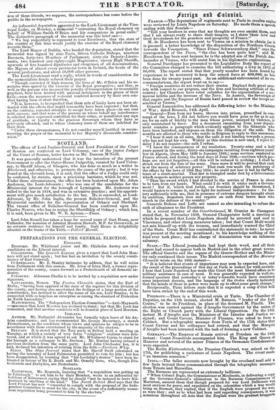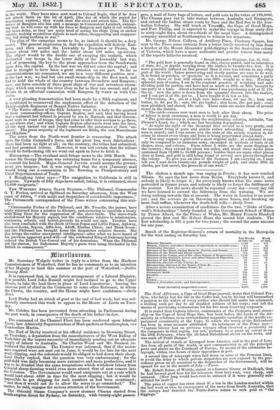,fortigu unh nInuigi.
FRANOL—The deputations a regiments sent to Paris to receive eagles were reviewed by Louis Napoleon on Saturday. He made them a speech. ending with this flourish-
" Tell your brothers in arms that my thoughts are ever amidst them, and that I am always ready to share their dangers, as I share 'their love and their devotedness for the grandeur and'prosperity of France."
M. de Heeckeren has been sent to Vienna on a mission to obtain (as it is guessed) a better knowledge of the disposition of the Northern Courts towards the Usurpation. "Since Prince Schwarzenberg died," says the correspondent of the Times, " the clue has been quite lost" : and M. Heeckeren has been sent because he is the adopted son of the Dutch Am- bassador at Vienna, who will assist him in his diplomatic explorations.
General Parcbappe has presented to the Legislative Body the report of the Committee charged to examine the bill authorizing a levy in 1852 of 80,000. The report stated that that yearly number has been found by experience to be necessary to keep the armed force at 500,000, as has been done for twenty years past. As an additional enforcement of its re.. commendations, the report went on to say—
"Foreign countries do not reduce their armies. England feels great anx- iety with respect to our progress, and the firm and becoming attitude of the country; her Chambers have voted subsidies for the organization of a nu- merous militia and the increase of the Navy. In Austria, the Sovereign of that empire and the Emperer of Russia have passed in review the troops as- sembled at Vienna." General Lamoricihre has addressed the following letter to the Minister of War ; dated Brussels, 14th April.
"General—Torn from my home, thrown into prison, proscribed in con- tempt of the laws, I did not believe you would have gone so far as to ask me for an oath of fidelity to the man whose power, usurped by violence, is only maintained by force. But a document emanating from your depart- ment contains a paragraph Which evidently applies to the Generals who have been banished, and imposes on them the obligation of the oath. Two months are allowed to those who reside in Belgium to reply to this summons.
"I hear it said on all sides, that the oath is not binding towards aperson who has not kept his own. Widely as this doctrine is now used, I reject it:. delay I do not require—the oath I refuse.
"I know the consequences of my resolution. Twenty-nine and a half years passed in the army, thirty-six campaigns resulting from eighteen years' war in Algeria, (from May 1830 to January 1848,) some services rendered to France abroad, and during the fatal days of June 1848,—services which per- haps are not yet forgotten —all this will be reduced to nothing; I shall be struck out from the lists of army. Once more it will be proved that rank is at the mercy of arbitrary power. That rank was made the patriiogrizf the officer by the laws of 19th May 1834; he could not lose it but by tnhe tence of a court-martial. That daw is trampled under foot by a Government which respects neither person nor property.
"Thus the sword which I had devoted to the service of France is about to be torn from my hands. What could I do with it under such a Govern- ment? But if, which God forbid, our frontiers aliould be threatened, I would hasten to resume it, and to fight for national independence : for his- tory sufficiently tells me, that in presence of extreme dangers brought about by ambition, despotism does not require an oath from brave men who march in the defence of the country." Generals Bedeau and Leflo are named as also intending to refuse the oath of allegiance to the President. In a recent number of the Constitutionnel, M. Granier de Cassagnac stated that, in November 1850, General Changarnier held a meeting at which he proposed that Louis Napoleon should be arrested and sent to Vincennes, and other strong measures taken ; but that Count Mole would not mix himself up with the treason, and immediately warned the Chief of the State. Count Mole has contraicted the statement in toto : he never was present at the meeting mentioned ; to his knowledge nothing of the kind ever took place ; and the charge of denunciation was an infamous calumny.
Swam—The Liberal journalists had kept their word, and all their papers had ceased to appear both in Madrid and in the other great tom The official Gazette and the organs of the Queen-Mother and the Minis- try only continued their issues. The Madrid correspondent of the Morning Chronicle wrote on the 10th instant—
"it is believed that events of importance may soon be expected here, and the result of the proceedings of this day at Paris is looked for with anxiety. I hear that Louis Napoleon has made this Court the most liberal offers as to military assistance in case of need. It was generally expected in well-in- formed quarters that yesterday's or today's Gazette would have contained some important decrees, and the language of the Orden clearly indicated that the minds of those in power were made up to effect some great change." Reciprocally, Paris letters state that it is expected a coup d'etat will have been struck by the end of this week.
PEEDMONT.—There is a Ministerial crisis at Turin. The Chamber of Deputies, on the 11th instant, elected M. Ratazzi, "leader of the Left Centre," to be its President, in place of the deceased M. Pinelli. The election was carried against the d'Azeglio Government by the union of the Right or Church party with the Liberal Opposition. On the 15th instant M. d'Azeglio and the Ministers of the Interior and Justice re- signed; and Count Cavour, Minister of Finance, was asked to form a Cabinet. But a telegraphic message from Turin of the 17th states that Count Cavour and his colleagues had retired, and that the Marquis d'Azeglio had been intrusted with the task of forming a new Cabinet. GERMANY.—The Emperor of Russia arrived at Potsdam on the 16th instant : Count Nesselrode accompanied him. The King and Queen of Hanover and several of the minor Princes of the Germanic Confederation were expected.
The Berlin Elatteradatsch, the Prussian Charivari, was seized on the 17th, for publishing a caricature of Louis Napoleon. The event made "an immense sensation."
INDIA.—The fuller accounts now brought by the overland mail add a few facts beyond those communicated through the telegraphic messages from Trieste and Marseilles.
The Burmese are represented as extremely bellicose.
"When Colonel Bogle, the Commissioner at Moulmein, in delivering a cell of the Governor-General's ultimatum to the Burmese Commissioners Of Martaban, assured them that though prepared for war Lord Dalhousie was most anxious for peace, and expatiated on the calamities which a war would bring on Burnish, they replied, that if the English were prepared for war, so were they ; and as to what had been said regarding consequences, it is as notorious throughout all Asia that the English were the greatest braggarts in the world. They have since sent word to Colonel Bogle, that if he does not attack them on the 1st of April, (the day at which the period for negotiation expired,) they would cross the river and attack him. The Go- vernor of Rangoon also has sent a message to Commodore Lambert, entreat- ing that he will come up with his force to Rangoon and fight it out without any more delay, as they are quite tired of seeing his ships lying at anchor outside, making mysterious signals to each other, disappearing and reappear- ing, but doing nothing in war." The plan of the campaign seems to be, as indeed it should be, a deep secret. The general impression is, that the expedition will destroy Ran- goon, and then ascend the Irawaddy to Deenobew or Prome' the former about 100 miles and the latter about 190 miles up-stream. The object would be the double one of escaping the malaria, which decimated our troops in the lower delta of the Irawaddy last war, and of possessing the key to the great approaches from the Southwards upon Ave, the capital. In the last war we did not enter the capital, and that is thought to have been a great omission on our part. So far as communications are concerned, we are in a very different position now : in the last war, we had but one small steam-ship in the fleet used, and had to hold the whole of the country between Deenobew and Rangoon ; now, our force consists of three great ships of war and seventeen steam- ship; which can sweep the river clear as far as they can ascend, and put Prome in as effectual connexion with Rangoon by water as with Cal- cutta.
A very pleasing demonstration had been made by a Sikh regiment, and is mentioned to countervail the unpleasant effect of the defection of the Thirty-eighth Regiment of Bengal Native Infantry. "The Native officers of the Sikh Infantry went in a body to the quarters of their commanding-officer, Captain Repton, and said, that having heard that a regiment had refused to proceed by sea to Bunnah, and that Govern- ment were in want of troops, they had come to offer their services to go there, or anywhere else; and when Captain Repton afterwards went into the lines, all the men turned out and loudly confirmed the assurances of their an- cients.' The peat majority of the regiment are Sikhs, the rest Musaulmans and Hindoos.'
The news from the North-west frontier is reassuring. The attack upon Sir Colin Campbell's force, and his great loss, were fabrications : there had been no fight at all ; on the contrary, the tribes had submitted, and had promised tribute. However, it was not certain that the tribute would be forthcoming till we went out again in force to fetch it.
HONOKONG.—The overland mail brings news to the 30th March. Go- vernor Sir George Bonham was returning home for a temporary absence, to recruit his health. Major-General Jervois would assume the govern- ment pro tempore; but it was expected that the next (January) mail would bring out a commission to Dr. Bowling as Plenipotentiary and Chief Superintendent of Trade.
A Hongkong letter says—" The emigration to California is still in progress. Upwards of fifty ships have sailed, taking, it is estimated, about 15,000 emigrants."
THE WESTERN AFRICA SLATE STATION.—The Philomel, Commander G. T. Forbes, arrived at Spithead on Saturday afternoon, from the West coast of Africa, "with mails and despatches of considerable importance." The Portsmouth correspondent of the Times writes concerning this arri- val—
" Commander Forbes of the Philomel, and Mr. Tweedie, the purser, have lately returned from a mission to Abomey, endeavouring to conclude a treaty with King Gezo for the suppression of the slave-trade. The slave-trade abolishment his Majesty signed, but the conditions relative to missionaries, residences, schools, and burial-grounds he would not sign. Treaties have also been concluded with the chiefs of Great Popoe and Little Popoe, Aghway, Goom-a-Loots, &gore, Affia-hoo, Adaffi, Elmma Chioce, and Blook-hoose; and the Philomel has brought home the despatches relative thereto. She also brings the rather unexpected intelligence—after what we have heard of his previous apparent good-will—of the celebrated King of Dahomey having ordered the British Vice-Consul out of his dominions. When the Philomel left the station, his Dahomean Majesty's ports were being blockaded by the British in consequence."



























 Previous page
Previous page